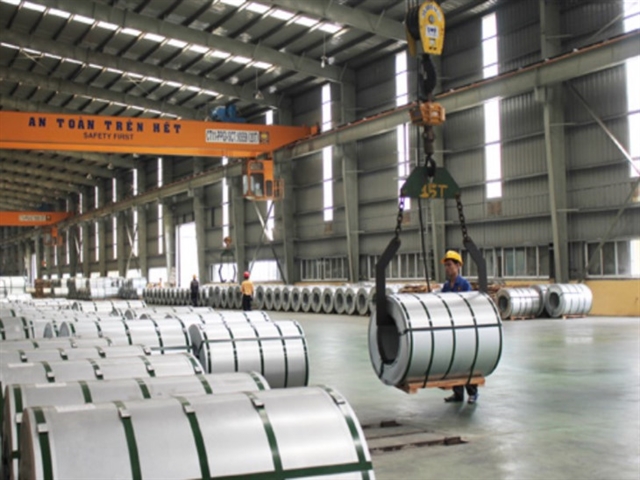The anti-dumping duties imposed on stainless steel has not created a monopoly in the market, said the Ministry of Industry and Trade (MoIT).

The anti-dumping duties imposed on stainless steel has not created a monopoly in the market, said the Ministry of Industry and Trade (MoIT).
The ministry’s Trade Remedies Authority of Viet Nam (TRAV) has said that without the anti-dumping measures and with the massive increase in imports to Viet Nam, the domestic steel industry will struggle to survive and develop.
The announcement was made in response to reports that the duties levied on imported stainless steel had created a monopoly.
The anti-dumping duty is one form of trade defence allowed by the World Trade Organisation (WTO) for its members to apply in the case of dumped imports from foreign countries causing significant damage to the domestic manufacturing industry.
On May 6, 2013, the MoIT received an application for a dossier requesting a final review from a manufacturer representing the domestic industry to investigate the dumping of stainless steel imports from China, Malaysia, Indonesia, and Taiwan (China).
After a year-long investigation and co-operation with a third country to compare prices, the ministry concluded that enterprises from China, Malaysia, Indonesia, and Taiwan exported their products to Viet Nam at very low prices to unfairly compete with Vietnamese producers.
Therefore, the ministry on September 5, 2014 decided to levy the anti-dumping duties.
According to the Viet Nam Steel Association, the country now has some 10 cold-rolled stainless steel producers. Of which, some producers have mostly served internal demands to produce steel pipes, water bottles and other products and not selling to the market.
Last year, stainless steel outputs of POSCO VST accounted for less than 50 per cent of the industry’s total output including internal consumption. The country’s stainless steel capacity would be increased by 400,000-500,000 tonnes per year as some factories would become operational, such as Nguyen Minh and Viet Quang.
The stainless steel products from other countries which do not face anti-dumping duties have still been imported into Viet Nam.
Statistics from the General Department of Customs show that stainless steel has continued to be imported from the four countries and territories as well as others since the application of the duty.
The total imported amount of stainless steel has increased from the period before applying the duty from countries such as South Korea, Japan and Thailand. Vietnamese buyers therefore have more choices in addition to local products.
In the period from July 1, 2017, to June 30, 2018, the imports of stainless steel accounted for up to 57.2 per cent of the country’s total consumption. Of which, imports from countries which did not face anti-dumping taxes made up 68.5 per cent while those from local producers accounted for 42.8 per cent.
The ministry said this was the reason there was no foundation to conclude that the local stainless steel industry or a domestic producer has a monopoly on the product.
In addition, with the duty levy, the price difference between local and imported stainless steel has been narrowed. The selling prices of POSCO VST’s stainless steel have always been higher than those of local producers as its products are in the higher quality segment. However, the difference has been also gradually narrowed.
POSCO VST’s market share in stainless steel has not increased sharply since the anti-dumping levy. Meanwhile, market shares of other domestic manufacturers have been on the rise.
There was no evidence that the application of anti-dumping measures from the ministry increased POSCO VST's position in the market of cold-rolled stainless steel.
TRAV said after applying the anti-dumping duties in October 2014, the local stainless steel sector has recovered and witnessed growth.
In the past, the market had the participation of POSCO VST and some other small scale companies. The market now has participation of many big firms.
During the investigation and application of the measures, the ministry considered the exemption for cold-rolled stainless steel products as input materials that could not be produced domestically to ensure consumers’ interests.
According to statistics, stainless steel of China, Indonesia, Malaysia and Taiwan has been investigated by anti-dumping or anti-subsidies groups around the world such as the US, the European Union (EU), Brazil, Mexico, India, Turkey and Eurasian Economic Union (EAEU).
The MoIT’s investigation and application of anti-dumping duties on imported stainless steel have followed regulations in the Law of Foreign Trade Management and WTO. The duty has been necessary to maintain an equal competitive environment between local and foreign businesses, contributing to promoting competition in the local market as well as attracting the participation of many manufacturers. It also ensures customers have more choices between locally produced and imported products. — VNS





